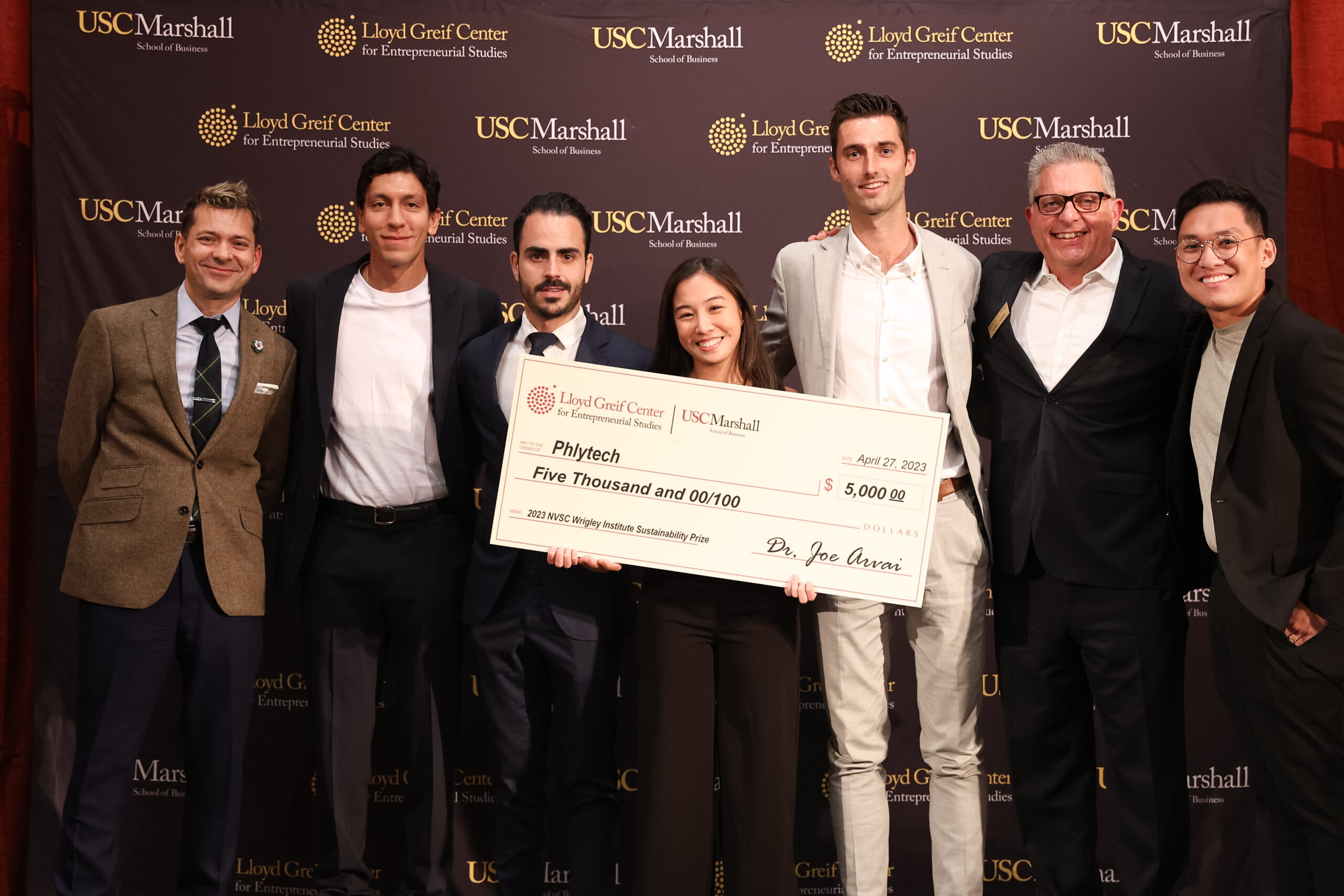Phlytech agri-startup founders share tips for eco-entrepreneurial success

Every year, USC community members with innovative business ideas are invited to participate in USC Marshall School of Business’s New Venture Seed Competition (NVSC), which is organized by the Lloyd Greif Center for Entrepreneurial Studies. This year’s competition welcomed more than 300 teams competing for upwards of $150,000 in funding, including the $5,000 Wrigley Institute Sustainability Impact Prize for sustainability-focused business ventures.
The 2023 Wrigley Prize was awarded to Phlytech, an agricultural technology company pioneering the use of soldier fly larvae as an alternative protein source for animal feed. In addition to winning the Sustainability Impact Prize, Phlytech also won third place overall and the Brittingham Social Enterprise Lab’s Marcil Social Impact Award.
We sat down with Phlytech founders and USC Entrepreneurship and Innovation students Ken Caliwara, Antonio Gil, Pammy Moran, Abhyudaya Motani, Jan-Paul Schwarz, and Felipe Vinas to learn about their vision and goals for the company. They also shared some helpful advice for fellow entrepreneurs hoping to address environmental challenges.
This interview has been edited for length and clarity.
Tell us about how Phlytech got started.
Phlytech started as an idea in Professor Albert Napoli’s USC class at the Marshall School of Business. We were shocked when a friend told us that 50% of raw materials from a banana processing plant are wasted because there is no commercial use for banana peels. Food waste is a huge problem not only there, but in California as well. What began as a chat quickly transformed into a robust idea after we did thorough research on the black soldier fly and more than 150 customer and key partner interviews. With that, we saw the unique potential of using food waste and producing a new protein source for animal feed using insects.
We competed in USC’s New Venture Seed Competition, winning $20,000 through the Social Impact Award and the Wrigley Institute Sustainability Impact Price. We knew this project was something that would leave the classroom because we are passionate about sustainability and helping the environment. It is the perfect opportunity for us to blend our skills, interests, and entrepreneurial studies to pursue what the Grief Center for Entrepreneurial Studies constantly encourages us to do: start a business and become part of the next generation of entrepreneurs.
What sustainability goals do you hope to achieve?
Our goal is to lead the efficient production of animal feed to match rising global food demand. We aim to achieve this by using food waste as the main feed for our black soldier fly larvae, which then provide a sustainable source of nutrition for aquatic animals and pets. This solution has many benefits, such as redirecting food waste from landfills (thus reducing C02 emissions) and providing an alternative to the traditional use of soy meal and fish meal for animal feed (thus reducing the problem of deforestation and overfishing, which are both significant contributors to human-made climate change). Our way of producing protein uses only 1% of water and land in comparison to traditional animal feed sources.
What is your long-term vision for growth and impact?
Given that the growing animal feed market is one of the significant contributors to global emissions, our long-term vision is to disrupt the market by proposing a financially-attractive and ecologically-sustainable alternative product for the climate. We are now seeking out partners and experts who can help us build our first prototype. Our long-term goal is to partner with many food waste suppliers in the U.S. to expand the production volume for insect products and sell them.
We want to be positive role models and demonstrate that you do not need to be an experienced industry expert to start a company. Businesspeople can bring a sustainable project to life with passion, commitment, and creativity – and they can become experts along the way.
What advice do you have for entrepreneurs hoping to break into the sustainability industry?
Build your own professional network of experts and supporters who open doors and help you transform a good idea into reality. Entrepreneurs must show perseverance in their vision while also being coachable so that they can push their idea through many iterations. We want to be positive role models and demonstrate that you do not need to be an experienced industry expert to start a company. Even two businesspeople can bring a sustainable insect project to life with passion, commitment, and creativity – and they can become experts along the way.
Anything else you’d like to share?
We are in the current cohort of the Cleantech Open Accelerator, the U.S.’s biggest Cleantech accelerator, and excited about opportunities coming up. We are very open to any advice, thoughts, or exciting ideas. Follow us on LinkedIn for updates, message us to chat, or write us an e-mail.
E-Mail: info.phlytech@gmail.com
